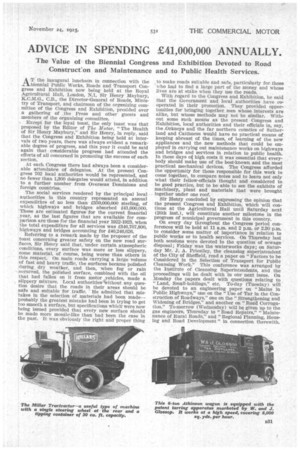ADVICE IN SPENDING £41,000,000 ANNUALLY.
Page 15

If you've noticed an error in this article please click here to report it so we can fix it.
The Value of the Biennial Congress and Exhibition Devoted to Road Construct:on and Maintenance and to Public Health Services.
AT the inaugural luncheon in connection with the biennial Public Works, Roads and Transport Congress and Exhibition now being held at the Royal Agricultural Hall, London, N.1, Sir Henry Maybury, K.C.M.G., C.B., the Director-General of Roads, Ministry of Transport, and chairman of the organizing committee of the Congress and Exhibition, presided over a gathering of the Press and other guests and members of the organizing committee.
Except for the loyal toast, the only toast was that proposed by the Editor of The Motor, "The Health of Sir Henry Maybury," and Sir Henry, in reply, said that the Congress and Exhibition being held at intervals of two years, there was always evident a remarkable degree of progress, and this year it could be said again that considerable progress had attended the efforts of all concerned in promoting the success of each section.
At each Congress there had always been a considerable attendance of delegates. At the present Congress 702 local authorities would be represented, and no fewer than 1,300 delegates would attend, in addition to a further number from Overseas Dominions and foreign countries.
The social services rendered by the principal local authorities in this country represented an annual expendititre of no less than £350,000,000 sterling, of which highways and bridges absorbed £41,000,000. These are estimated figures for the current financial year, as the last figures that are available for comparison are those for the financial year 1922-1923, when the total expenditure for all services was £346,707,800, highways and bridges accounting for £40,246,626.
Referring to a remark made by the proposer of the toast concerning greater safety on the new road surfaces, Sir Henry said that, under certain atmospheric conditions, every surface was more or less slippery, some material, of course, being worse than others in this respect. On main roads carrying a large volume of fast and heavy traffic, the surfaces became polished during dry weather, and then, when fog or rain occurred, the polished surface, combined with the oil that had fallen on it from motor vehicles, made a slippery mixture. Local authorities without any question desire that the roads in their areas should be safe and suitable for traffic. He admitted that mistakes in the selection of materials had been made— probably the greatest mistake had been in trying to get too smooth a surface, but specifications which' were now being issued provided that every new surface should be made more mosaic-like than had been the case in the past. It was obviously the right and proper thing to make roads suitable and safe, particularly for those who Iiajl to find a large part of the money and whose lives are at stake when they use the roads.
With regard to the Congress and Exhibition, he said r that the Government and local authorities have cooperated in their promotion. They provided opportunities for bringing together men whose interests are alike, but whose methods may not be similar. Without some such means as the present Congress and Exhibition, local authorities and their officials in, say, the Orkneys and the far northern counties of Sutherland and Caithness would have no practical means a keeping abreast of the times, of learning of the new appliances and the new methods that could be employed in carrying out maintenance works on highways and bridges and services in relation to public health. In these days of high costs it was essential that everybody should make use of the best-known and the most practical mechanical devices. The Congress afforded the opportunity for those responsible for this work to come together, to compare notes and to learn not only what their fellow-officials thought and considered to be good practice, but to be able to see the exhibits of machinery, plant and materials that were brought together under one roof.
Sir Henry concluded by expressing the opinion that the present Congress and Exhibition, which will continue at the Agricultural Hall until Saturday next (26th inst.), will constitute another milestone in the progress of municipal government in this country.
On every day throughout the Congress period conferences will be held at 11 a.m. and 2 p.m. or 2.30 p.m. to consider some matter of importance in relation to public works or to health services. On Thursday last both sessions were devoted to the question of sewage disposal; Friday was the waterworks days; on Saturday Mr. S. A. Priestley, the cleansing superintendent of the City of Sheffield, read a paper on "Factors to be Considered in the Selection of Transport for Public Cleansing Work." This conference was arranged by the Institute of Cleansing Superintendents, and the proceedings will be dealt with in our next issue. On Monday the papers dealt with questions relating to " Land, Small-holdings," etc. To-day (Tuesday) will be devoted to an engineering paper on "Mains in Public Highways," one on the "Use of Tar in the Construction of Roadways," one on the "Strengthening and Widening of Bridges," and another on "Road Corrugation." To-morrow (Wednesday) will be given up to the gas engineers, Thursday to "Road Repairs," "Maintenance of Rural Roads," and "Regional Planning, Housing and Road Development" in connection therewith.




































